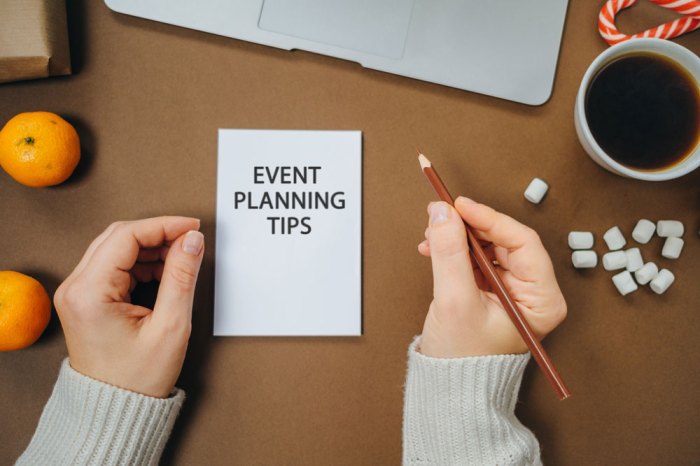Event Planning Tips takes center stage, inviting you into a world of expertise and creativity, ensuring an engaging and original read.
Get ready to dive into the essential steps and strategies for planning and executing unforgettable events.
Importance of Event Planning: Event Planning Tips
Event planning is essential for the success of any event as it helps in organizing all the necessary elements to ensure a smooth and well-executed experience for attendees. Effective event planning can significantly impact the outcome of an event by ensuring that all details are taken care of, potential issues are anticipated and addressed, and the event runs seamlessly from start to finish.
Managing Budgets and Resources Efficiently
Event planning plays a crucial role in managing budgets and resources efficiently. By carefully planning and budgeting for every aspect of the event, organizers can avoid overspending, identify cost-saving opportunities, and ensure that resources are allocated effectively. This can lead to a successful event that meets its objectives without unnecessary expenses or resource wastage.
Key Steps in Event Planning

Planning a successful event requires careful attention to detail and strategic execution. Setting clear objectives and timelines is crucial to ensure that everything runs smoothly. Here are the key steps involved in event planning:
Setting Clear Objectives, Event Planning Tips
- Define the purpose of the event and what you hope to achieve.
- Establish specific, measurable goals to track progress and success.
- Communicate objectives clearly to all stakeholders involved.
Creating a Detailed Event Timeline
- Start by determining the event date and working backward to set deadlines for each task.
- Include key milestones, such as securing a venue, sending invitations, and finalizing details.
- Allocate time for unexpected delays or issues that may arise during the planning process.
Choosing the Right Venue
When it comes to event planning, selecting the perfect venue is crucial for the success of your event. The venue sets the tone and atmosphere, so it’s essential to choose wisely.
Factors to Consider When Selecting a Venue
- Capacity: Ensure the venue can accommodate the number of guests you expect.
- Location: Choose a convenient location that is easily accessible for your guests.
- Amenities: Consider what amenities the venue offers, such as parking, catering options, and audiovisual equipment.
- Cost: Stay within your budget and negotiate the best possible deal.
- Atmosphere: Make sure the venue aligns with the theme and vibe of your event.
Tips on How to Negotiate with Venues
- Do your research and compare prices from different venues.
- Ask for discounts or package deals, especially if you are booking multiple services.
- Be flexible with your event date and time to secure a better rate.
- Consider off-peak seasons for lower prices.
- Don’t be afraid to negotiate and ask for additional perks or upgrades.
Importance of Visiting the Venue in Person
Before finalizing a venue for your event, it is crucial to visit the location in person. This allows you to:
- Assess the cleanliness and overall condition of the venue.
- Visualize the setup and flow of the event space.
- Meet with venue staff and discuss any specific requirements or concerns.
Budgeting for an Event
Planning an event involves more than just picking a date and venue. Budgeting is a crucial aspect that requires careful consideration to ensure the success of your event. By creating a comprehensive budget, allocating funds effectively, and preparing for unexpected expenses, you can set yourself up for a smooth and successful event.
Creating a Comprehensive Event Budget
Creating a comprehensive event budget involves identifying all potential expenses and sources of revenue. Start by listing all the different aspects of your event that will require funding, such as venue rental, catering, entertainment, decorations, marketing, and staffing. Research and gather quotes from vendors to get an accurate idea of costs. Be sure to also consider miscellaneous expenses, such as permits, insurance, and transportation.
Once you have a clear picture of all potential costs, create a detailed budget spreadsheet to track expenses and ensure you stay within your financial limits.
Tips for Allocating Funds Effectively
When allocating funds for your event, prioritize expenses based on their importance and impact on the overall experience. Allocate a larger portion of your budget to key elements that are essential for the success of your event, such as venue rental and catering. Consider areas where you can save costs, such as opting for a buffet-style meal instead of plated dinners or utilizing in-house AV equipment instead of renting expensive audiovisual gear.
Be strategic in your spending to ensure you get the most value out of every dollar.
Strategies for Managing Unexpected Expenses
Despite careful planning, unexpected expenses can still arise during the event planning process. To manage these unforeseen costs, build a contingency fund into your budget to account for any emergencies or last-minute changes. Consider negotiating payment terms with vendors to allow for flexibility in case of unexpected expenses. Keep track of all expenses and regularly review your budget to identify any potential overspending or areas where you can reallocate funds to cover unexpected costs.
By staying vigilant and prepared, you can effectively manage unexpected expenses and keep your event budget on track.
Creating Event Marketing Strategies
Marketing plays a crucial role in the success of an event, as it helps to generate awareness, attract attendees, and build excitement. Effective marketing strategies are essential to reach the target audience and ensure a high turnout for the event. Let’s explore some tips on creating successful event marketing campaigns and their impact on event attendance.
Importance of Event Marketing
Marketing is key to spreading the word about your event and reaching potential attendees. Without effective marketing strategies, your event may not gain the visibility it needs to attract a large audience. By implementing a well-thought-out marketing plan, you can increase event attendance and create buzz around your event.
- Utilize social media platforms to promote your event and engage with your target audience.
- Collaborate with influencers or industry leaders to help promote your event to their followers.
- Create compelling content that highlights the unique aspects of your event and encourages people to attend.
Examples of Successful Event Marketing Campaigns
Coachella Music Festival:
Coachella’s marketing strategy involves leveraging social media to create hype around the event. By sharing teasers, lineup announcements, and behind-the-scenes content, Coachella builds anticipation and drives ticket sales.
Apple Product Launch Events:
Apple’s product launch events are known for their secrecy and exclusivity, which creates a sense of urgency and excitement among consumers. By generating buzz through media coverage and live streams, Apple’s events attract a global audience and drive sales.
Comic-Con International:
Comic-Con’s marketing strategy focuses on engaging with fans through social media, contests, and exclusive merchandise. By building a community around the event and offering unique experiences, Comic-Con ensures high attendance and continued success.
Managing Vendors and Suppliers

When it comes to event planning, managing vendors and suppliers is crucial for the success of the event. Vendors and suppliers play a significant role in providing the necessary products and services that bring your event to life. From catering services to audiovisual equipment, choosing the right vendors and suppliers can make or break your event.
Choosing Reliable Vendors and Negotiating Contracts
- Research potential vendors and suppliers to ensure they have a good reputation and experience in the industry.
- Ask for references and check reviews from previous clients to gauge their reliability.
- Negotiate contracts that clearly Artikel the deliverables, payment terms, and cancellation policies to avoid any misunderstandings.
- Communicate openly with vendors and suppliers to establish a good working relationship based on trust and mutual respect.
Building Strong Relationships with Vendors
- Be professional and respectful in all your interactions with vendors and suppliers.
- Communicate your needs and expectations clearly to avoid any miscommunication.
- Show appreciation for their hard work and dedication to your event.
- Consider long-term partnerships with vendors who consistently deliver high-quality products and services.